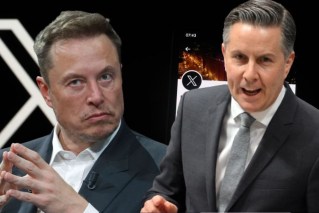Garry Linnell: Enslaved by your phone? One solution is as elegant as a brick to the head

He had thick spectacles, lived at home with his mother, collected comic books, blushed and stammered whenever he spoke to a girl, wore white socks and always – always – hitched his pants just below his armpits.
His name was Derek. Or maybe it was Kelvin. Whatever.
All I could see – apart from the sweat plastering his dandruff-speckled hair to his scalp ≠ was a glazed look in his eyes and a puddle of drool forming in the corners of his mouth. He was excited.
It was the mid-1980s in a daily newspaper office.
Back then, company IT departments were not staffed by large numbers of young bearded men who arrived at work on scooters while sipping wheatgrass shots and listening on expensive Bluetooth earphones to Moroccan blues bands backed by goatskin drums.
Our IT department consisted of Derek. Or Kelvin.
He was in raptures because this was the company’s first mobile telephone. He was sweating because he’d had to haul it to my desk on a large trolley.
I’d been chosen to be the guinea pig.

The old-school bricks. Photo: Getty
That night I was to cover a football match and the boss wanted to see whether these new-fangled contraptions would make our lives easier, or were just a status symbol used by millionaire businessmen to call their offices from their cars and check the latest share prices.
Derek/Kelvin carefully placed the large phone on my desk.
Then he squatted and, like a weightlifter attempting a new world record, screwed up his face, grunted, puffed out his cheeks and, wobbling ever so slightly, lifted the battery pack that went with the phone.
A crowd gathered. “It’s incredible,” said one of my colleagues, gazing in wonder at the enormous device.
“It’s like something out of Star Trek,” gushed another.
The following day I gave the damn thing back to Derek/Kelvin.
“Over-rated and next to bloody useless,” I told him.
The concrete stands of the football stadium had blocked the phone’s analogue signal and the battery had died after 10 minutes of use. I’d also twisted my back carrying it back to the car.
“Passing fad,” I said. “These things won’t catch on at all.”
So last weekend, almost 40 years later, I sat down to be reminded – just one more time – about my appalling inability to read the future.
The Social Dilemma – a hybrid documentary-drama that examines the extraordinary power wielded by social media and humanity’s obsession with mobile devices – has become one of the most-watched films in Netflix history.
It features an array of cool-looking young men who undoubtedly rode scooters when they worked as engineers at Google and Facebook but who now, like former Big Tobacco executives, want to warn the world about the detrimental health effects of their product.
There’s nothing terribly new or revelatory about their claims.

Google’s new campus under construction in 2019. Photo: Getty
We’ve known for years that companies like Facebook, Snapchat, Instagram and others have invested heavily in psychologically manipulating us by playing with our levels of dopamine – the brain chemical that motivates us and makes us feel good.
Using prompts such as the “like” button and constant notifications that new messages/photos/comments have arrived, they tease, prod and lead us into an ever-deepening digital world that blurs the line with reality.
It’s why the average person now spends between two and four hours each day staring at their phone, touching it about 2500 times, experiencing panic when they misplace it and obsessively checking it even when no new notifications have flashed across its screen.
As The Social Dilemma reminds us repeatedly, we are enslaved by our phones, sucking constantly on what has become a digital pacifier.
And this unprecedented change in human behaviour has been designed for one reason – to extract as much personal data from us as possible.
Every whim, desire and ambition – Facebook and Google often know more about you than your partner – is harvested so it can be sold to advertisers. And as the documentary glibly informs us, if you’re not paying for the product, you are the product.
But the looming issue now – apart from the rising social and personal costs that include extraordinary increases in teen suicides and the undermining of democracy through the rapid spread of manipulative fake news – is what do we do about it?
How do you legislate and bring to heel companies that wield more power than the politicians and legislators elected to scrutinise them?

Facebook co-founder and CEO Mark Zuckerberg after testifying on Capitol Hill. Photo: Getty
The Social Dilemma has its faults – its moments of scripted drama are often cliched and detract from the seriousness of its message,
But buried deep within its 90 minutes are three words that might offer a way for us to bring the beast under control.
Asked what potential solutions there are, one of the hipsters who helped create the monster now feeding on our souls offers this: “A data tax.”
Facebook, Google and their ilk are nothing more than mining companies. They have invested heavily in extracting a precious substance – our personal information -– that can be later sold for profit.
So instead of trying to devise legislation and governance procedures that will inevitably contain loopholes tech companies will easily overcome and exploit, why not treat the industry the way we treat most others?
A tax – a few cents on all those bytes of personal information – would raise revenues to help treat the increasing impact of social media and reduce the sell-on value of personal data.
The resulting impact on profit might also make these tech companies review the obligations they have to all of us.
And for once, it would be us doing the manipulating.
Garry Linnell was director of News and Current Affairs for the Nine network in the mid-2000s. He has also been editorial director for Fairfax and is a former editor of The Daily Telegraph and The Bulletin magazine








